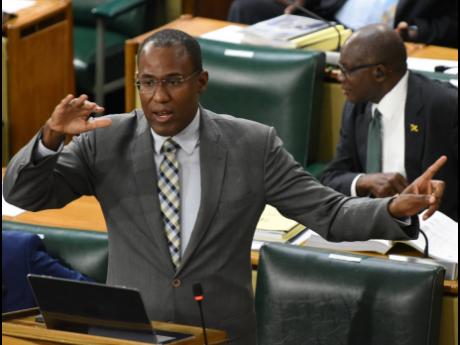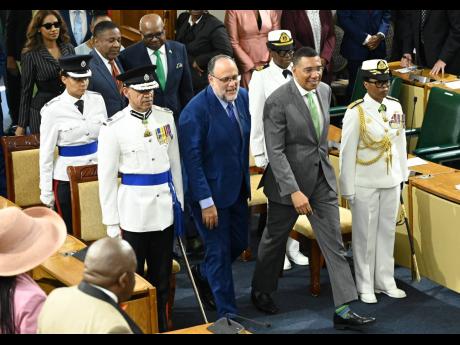FOCUS ON ROADS
Health, debt reduction also among priorities as Gov’t plans $1.34 trillion spending for 2024-2025
The Government intends to spend $1.34 trillion for the financial year 2024-2025 to manage the country’s affairs.
The figure, which was revealed as Finance Minister Dr Nigel Clarke tabled the Estimates of Expenditure in Parliament on Thursday, is $250 billion, or 23 per cent more than last year’s Budget of $1.09 trillion. Given the 6.9 per cent inflation experienced over the last 12 months, the real increase in the Government’s Budget is just over 16 per cent.
Clarke told the House that just over $1 trillion of the Budget would be financed by taxes and other receipts while about $300 billion in loans would satisfy the shortfall.
The bulk of the expenditure – $1.26 trillion – will go towards recurrent or day-to-day expenditure while $80 billion will go towards special projects or capital expenditure. Debt service will account for $491.2 billion, or 38.95 per cent, of the total recurrent budget while non-debt recurrent expenditure will be $769.9 billion.
Clarke said that the non-debt recurrent expenditure amount includes nearly $328 billion for day-to-day expenses for ministries, departments, and agencies while the rest will go towards salaries.
“Non-debt recurrent expenditure includes allocations for recurrent programme expenses at $327.8 billion as well as compensation expenses at $442.0 billion. The compensation allocation includes an estimated amount to conclude the implementation phase of the restructured compensation system during this fiscal year,” Clarke said, noting that wages and salaries are projected to represent 12.6 per cent of the total of goods and services produced – gross domestic product – in 2024-2025.
The Government will be spending heavily on roads.
Clarke says the capital expenditure of $80 billion includes an allocation to commence implementation of the SPARK programme during the 2024-2025 financial year. SPARK – Shared Prosperity Through Accelerated Improvement to our Road Network – is a $40-billion road-improvement project to modernise more than 2,000 roads islandwide. The Government announced the programme in the lead-up to the local government elections.
BIG SPENDING ON HEALTH
There will also be big spending on health. The capital expenditure includes “allocations for the most comprehensive health infrastructure improvement since independence”, according to Clarke.
“Approximately $12 billion is being allocated for the modernisation of the Spanish Town Hospital, the continued construction of the new Western Children and Adolescents Hospital, the rehabilitation of Cornwall Regional Hospital, as well as upgrades to the May Pen and St Ann’s Bay hospitals and the Greater Portmore and St Jago Park health centres,” the finance minister said.
Regarding debt-servicing payments, Jamaica has about $317 billion in debt that becomes due during the upcoming fiscal year, Clarke says. Debt is retired through amortisation payments, and the finance minister says a large chunk of the maturing debt was pre-financed, at lower interest rates, through Jamaica’s entry into the resilience and sustainability financing facility with the International Monetary Fund.
Loan financing for the 2024-2025 financial year is programmed at $191.4 billion, according to Clarke. He says this, combined with the $317 billion amortisation amount, will contribute to a net reduction in the debt as Jamaica continues to work towards a debt-to-GDP target of 60 per cent or less.
“Debt-to-GDP is on track for 72.2 per cent by March 31, 2023, and is projected to be 67.2 per cent by March 31, 2024 ... . If achieved, this will be the lowest debt ratio in well over 40 years,” Clarke declared.
The estimates will go before the Standing Finance Committee of Parliament between March 5 and 7, 2024, before the finance minister opens the Budget Debate on March 12.
In tabling the Budget, Clarke noted that it was being presented on time although the local government elections will be held on February 26. He said that this is unlike several instances in the past, where elections substantially delayed the presentation of the Budget.
“Election or no election, the national Budget must be passed in the House of Representatives by March 31 of each year. This brings order, increases certainty, and allows citizens to plan. ... The people’s business must go on,” Clarke said.


